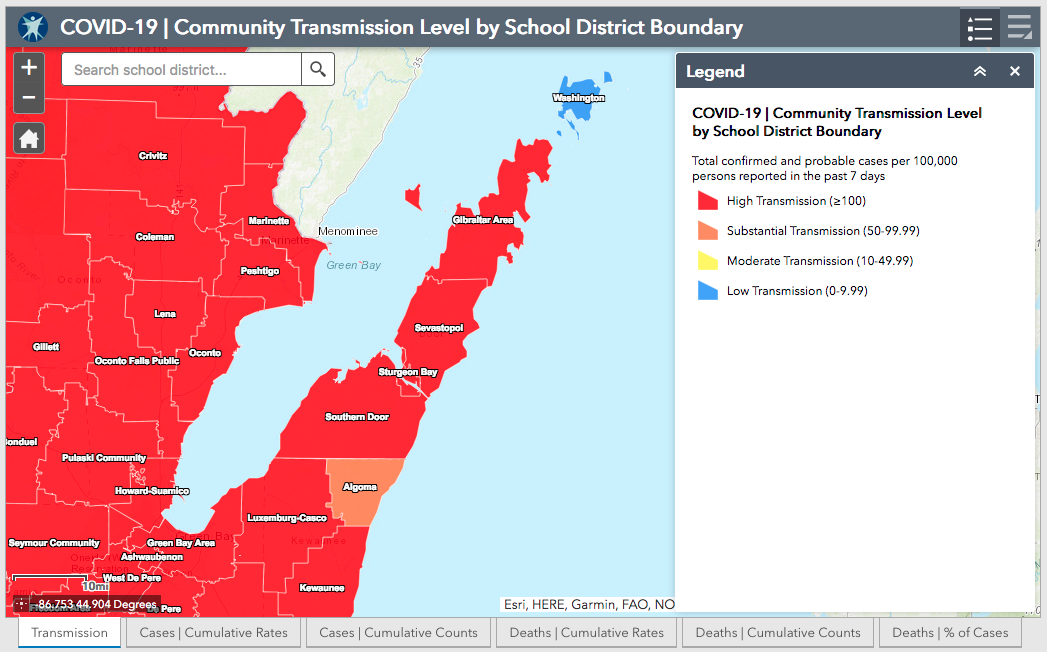Door County Public Health has serious concerns about county school districts’ loosening of Covid-19 protocols in recent weeks, Public Health Officer Susan Powers said last week.
Covid-19 transmission is still at a “high” level among residents of every county school district except Washington Island, according to data from the Wisconsin Department of Health Services.
Cases among children are driving that spread, Powers said. Cases among residents aged 0 to 18 have doubled this year in September and October compared to those same months in 2020, even as cases among school staff have declined.
“The under age 18 group is carrying the largest burden of disease and definitely driving community transmission,” Powers said.
Powers said she’s also concerned about a dramatic rise in hospitalizations among all Covid-19 cases in recent months. There have been 48 hospitalizations in Door County since July 1, according to Public Health data – more than twice the number of hospitalizations during the first half of 2021.
Most schools not following CDC guidance
Door County school districts have implemented a range of different Covid-19 protocols this fall, and most have shifted those protocols since the beginning of the school year. Most are not adhering to guidance from the Centers for Disease Control and Prevention (CDC), which Public Health follows.
The CDC recommends universal masking among all students and staff and at-home isolation for students who have symptoms or test positive for Covid-19. It also recommends a 14-day quarantine for unvaccinated students who were in close contact with someone who tested positive. Fully vaccinated students who are close contacts do not need to quarantine unless they have symptoms, under the CDC guidance.
At the start of the 2021-22 school year, only Gibraltar and Washington Island schools required all students to wear masks. By late September, as cases of Covid-19 were spiking in the county, Sevastopol, Sturgeon Bay and Southern Door schools also implemented mask mandates at the urging of Public Health and the Door County Medical Center.
About a month later, Sevastopol and Southern Door went back to optional masking, with the Southern Door change taking effect Nov. 1. The Sturgeon Bay school board last week voted to follow suit. Sturgeon Bay students in grades 7 to 12 are no longer required to wear masks as of Monday, and masking will become optional for students in grades pre-K through 6 starting Jan. 3.
Today, the Washington Island School District requires a 10-day quarantine period for family members of positive cases and unvaccinated close contacts, said Sue Cornell, the district’s administrator of business services, in an email. Vaccinated close contacts do not need to quarantine.
At Gibraltar, close contacts do not have to quarantine unless they show symptoms, superintendent Tina Van Meer said in an email. (Disclosure: Gibraltar school board president Stephen Seyfer is a Knock board member.)
Additionally, Van Meer said, “If the virus is spreading in a family, unvaccinated members of the household must quarantine.” That quarantine period is 10 days.
At Sevastopol, close contacts are not required to quarantine but must wear a mask while at school, superintendent Kyle Luedtke said in an email.
Sturgeon Bay and Southern Door have taken similar approaches to quarantining for close contacts. In both districts, close contacts who are not in the same household as a positive case can come to school, but must wear a mask, as long as they don’t have symptoms.
The districts differ in how they handle quarantining for close contacts who are in the same household as a positive case. In Sturgeon Bay, such students can come to school masked, regardless of their vaccination status. In Southern Door, such students who are unvaccinated must “quarantine for 10 days from when their positive household member is released from their 10 day isolation, as long as they are asymptomatic,” according to the district’s guidance for parents, for a total of up to 20 days of quarantine.
Schools offer varying explanations for their approaches
Schools have described different rationales in explaining their decision-making processes around Covid-19 protocols.
Luedtke said in an interview that Sevastopol has seen very few positive cases overall; he said he doesn’t believe requiring masking and quarantining close contacts were making a difference.
“Public Health and Door County Medical Center have recommended we mask everybody,” Luedtke said. “We’re not taking that recommendation at this time.”
Powers said cases among children alone don’t give a complete understanding of the benefits of Covid-19 mitigation strategies.
“Children generally have mild symptoms or are asymptomatic, and I think that is causing a lot of concern on the part of educators,” Powers said. “Yet what they aren’t seeing is the larger picture ... because (children) have Covid, they can spread it to adults who are more vulnerable to severe disease, hospitalization and death.”
“We’re a reflection of our local community. We should be. It’s not about being better or worse. Our community members have spoken, and they’re at different points on the issue.”
Dan Tjernagel, Sturgeon Bay School District Superintendent
Luedtke said he also sees Covid-19 protocol decisions in terms of individual choice. He said the district was more cautious before vaccines for Covid-19 were available, but now adults and older students have had the chance to get vaccinated.
Powers said that approach doesn’t work yet because the county and other medical providers are just starting to make vaccines available for younger students.
“We hope that there will come a time when that sort of strategy can be used, but at present, we are just beginning to vaccinate that younger age group,” she said. “We are continuing to vaccinate teens. The last time I checked, the vaccination rate for teens in Door County was a little over 50 percent. We’ve got some work to do yet.”
Likewise, Powers said any return to optional masking in January is “simply too soon.” The Sturgeon Bay school board has since voted to adopt that approach.
“I would ask that they not consider that until the community disease activity level goes down,” Powers said of any school district thinking about such a change. “When you look at the hospitalizations, that’s the concern as well.”
“Let’s look at what time of year it is,” she added. “We’re all moving indoors, and then we’re all going to get together and celebrate holidays.”
Sturgeon Bay superintendent Dan Tjernagel said part of his approach to Covid-19 protocols has been driven by concern for students for whom isolating or quarantining might not be practical, such as those with working parents or whose families live in small apartments.
In addition, Tjernagel said, some students get two meals per day at school. His district has continued to offer free meals for all students this year. Delivering those meals to students quarantined at home wouldn’t be feasible, Tjernagel said; nor would asking teachers to continue juggling simultaneous in-person and virtual instruction indefinitely.
Schools have to look out for students’ health overall, including mental health, Tjernagel said. When people say schools aren’t following public health guidance, he said, “It’s not that simple.”
Powers said she understands those concerns.
“We talk to families when we do contact tracing and appreciate their challenges with isolation and quarantine – whether they can go to work, whether they have to stay home with their children,” she said. But children now are making up a greater share of Covid-19 cases in the county overall, she said.
“Our perspective is – rather than, ‘I’m tired of this, let’s not do this’ – ‘I’m tired of this, let’s keep masking, let’s keep distancing, let’s keep these mitigation measures in place so we can get through this.’”
Susan Powers, Door County Public Health Officer
Tjernagel said he believes school boards and administrators have to work with community members where they are, taking into account different opinions about Covid-19 protocols.
“We don’t do this in a vacuum – we need our staff, the cooperation of students and families, the community,” he said. “It’s everybody. If we look at a situation like this, it’s not us in an ivory tower saying this is what we think on this one topic and this is what you're going to do whether you like it or not. I don’t think that’s a winning strategy.”
“We’re a reflection of our local community,” he added. “We should be. It’s not about being better or worse. Our community members have spoken, and they’re at different points on the issue.”
Powers said she hopes the community doesn’t give up on proven Covid-19 mitigation strategies.
“I know everyone’s tired of it,” she said of the pandemic. “We’re all a little tired of it here (at Public Health). Our perspective is – rather than, ‘I’m tired of this, let’s not do this’ – ‘I’m tired of this, let’s keep masking, let’s keep distancing, let’s keep these mitigation measures in place so we can get through this.’”

